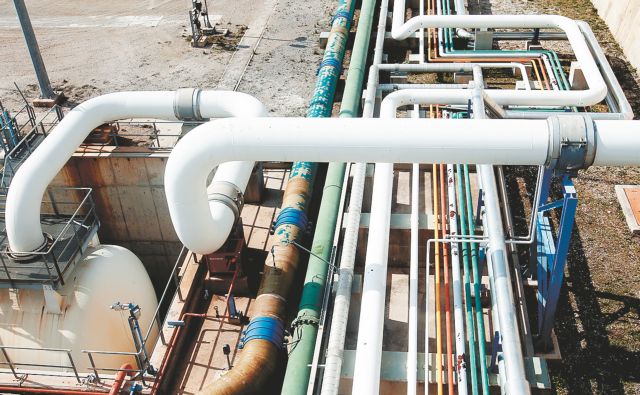
Measures to decrease energy consumption are being taken, due to price hikes, not only in businesses but also in households. At the same time, the fact that industries started to prefer cheaper fuels in combination with the generally better weather conditions, compared to last year, led to a decrease in electricity and gas consumption in Greece.
In particular, as the latest data from the Independent Power Transmission Operator show, in July, total demand on the electricity system in the country decreased by 17% compared to July 2021. Indeed, especially for high-voltage industries, demand was reduced by 5.5%, which is mainly attributed to the curtailment of the operation of LARCO gradually by 70% until July. As for demand – which mainly reflects consumption in households and small businesses – it was reduced by 11.5%.
Limited gas consumption
Regarding natural gas consumption, as the Operator of the National Natural Gas Transmission System told to ot.gr, it was limited during the months of April until July. More specifically, it was reduced by 13% in July, by 21% in June, by 14% in May and by 47% in April. This is because several industries switched to cheaper alternative fuels, but mainly because of the shift by refineries to the use of naphtha. This was also pointed out at the beginning of the summer by Motor Oil’s deputy CEO, Mr Petros Tzanetakis (during the analysts’ briefing on the occasion of the first quarter results), stressing that energy costs remain high, although the use of naphtha in the refinery has replaced natural gas for the time being.
In any case, as reflected by the data published by the Operator of the National Natural Gas Transmission, gas use in Greece had increased in February and March (by 11% and 18% respectively), while a slight drop in demand of 7% had been recorded in January.
However, it is noteworthy that the May-July quarter saw a huge increase in gas exports of 253% in May, 226% in June and 743% in July.
The issue of energy saving was also mentioned, yesterday, by the Greek Energy Minister, Mr Kostas Skrekas, stressing that it should become part of our everyday life, as in Germany and Italy.
Reducing energy consumption in public buildings
In Greece, the operation “thermostat” has come into force, aiming to reduce energy consumption in public buildings by 10%, on an annual basis, and by 30%, overall, by 2030. However, the first step has not yet been taken, i.e. the registration of all properties in the public sector. Then, an energy manager, preferably someone specialized in engineering, should be appointed in each building, in order to carry out an energy audit and monitor the operation of all public and municipal buildings and facilities. This is an obligation that has been foreseen for years by the relevant legislation, but has yet not been fulfilled.
Once the energy managers are appointed, it is estimated that it will take about a year to make an initial assessment of the situation and to verify whether the adjustment of the “thermostat” for the air conditioning and the heating systems and the other measures proposed can lead to a 10% saving, otherwise additional measures or energy shielding of the buildings will have to be taken into consideration.
However, no one yet knows the real situation of public buildings (estimated at between 12,000 and 150,000) as few of them have been issued with energy performance certificates. It is estimated that only 8 % are at least C energy efficient.
Measures in other Member States
At the same time, in the EU, the Member States are taking drastic measures to reduce energy consumption. On Thursday, in Spain, the Parliament ratified the energy saving measures proposed by the Spanish government, although most of them had already been in force since the beginning of the month. Thus, in shops, cultural venues, airports and railway stations, the thermostat of air conditioners will not fall below 27°C in summer and will not rise above 19°C in winter. At 22.00 the lighting in shop windows and public buildings will also be switched off.
Germany is also taking drastic, mandatory energy-saving measures, such as limiting street lighting, banning heating in swimming pools and lighting in shop windows, offices and billboards, reducing the thermostat in public buildings and preferring public transportation, etc. France, on the other hand, is launching its energy austerity program (Sobriété énergétique in French).
In the meantime, various companies are also taking energy-saving measures, such as the French Carrefour, the Belgian Colruyt and Ahold, etc.
Reducing gas consumption
Regarding the overall European effort to reduce gas consumption by at least 15% compared to the average consumption of the previous five years, Greece succeeded in including in the relevant text a provision that, exceptionally, allows the calculation of the reduction compared to the previous year. In addition, in case of an emergency, quantities of gas used by power plants that are critical for the stability of the system can be excluded from the calculation.
Latest News

Airbnb Greece – Initial CoS Ruling Deems Tax Circular Unlawful
The case reached the Council of State following annulment applications filed by the Panhellenic Federation of Property Owners (POMIDA)

Mitsotakis Unveils €1 Billion Plan for Housing, Pensioners, Public investments
Greek Prime Minister Kyriakos Mitsotakis has announced a new set of economic support measures, worth 1 billion euros, aiming to provide financial relief to citizens.

Alter Ego Ventures Invests in Pioneering Gaming Company ‘Couch Heroes’
Alter Ego Ventures' participation in the share capital of Couch Heroes marks yet another investment by the Alter Ego Media Group in innovative companies with a focus on technology.

Corruption Still Plagues Greece’s Driving Tests
While traffic accidents continue to claim lives on Greek roads daily, irregularities and under-the-table dealings in the training and testing of new drivers remain disturbingly widespread

Pope Francis Died of Stroke and Heart Failure Vatican Confirms
As news of the official cause of death spread, tributes poured in from across the globe. The 1.4 billion-member Catholic Church is united in grief, remembering a pope who championed inclusion, justice, and compassion

Increase in Both Museum Visits, Revenues for 2024
As expected, the Acropolis was the top archeological site in the country, followed by Sounion, Mycenae, the ancient theater of Epidaurus, and Vergina in northern Greece

Where Greece’s Tourists Come From: A Look at 2025’s Top Visitor Markets
The United Kingdom continues to hold the top spot as the largest source of incoming tourism, with 5.6 million seats booked for Greece this summer — up 2.2% from last year. This accounts for 20% of all international air traffic to Greece

Pope Francis: A Pontiff Who Reshaped the Papacy and Sparked a Global Conversation
His first words from the balcony of St. Peter’s Basilica—“Brothers and sisters, good evening”—set the tone for a pontificate that would challenge norms, favor mercy over dogma, and bring the papacy closer to the people.

When Blue Skies was Unmasked as ND’s Political ‘Slush Fund’
The fact that so many top New Democracy (ND) party cadres were paid by the firm Blue Skies, owned by Thomas Varvitsiotis and Yiannis Olympios, without ever citing this publicly, raises very serious moral issues, regardless of the legality

Greek Women’s Water Polo Team Top in the World after 13-9 Win Over Hungary
The Greek team had previously defeated another tournament favorite, the Netherlands, to reach the final.











![Πλημμύρες: Σημειώθηκαν σε επίπεδα ρεκόρ στην Ευρώπη το 2024 [γράφημα]](https://www.ot.gr/wp-content/uploads/2025/04/FLOOD_HUNGRY-90x90.jpg)




![Ξενοδοχεία: Μεγάλο το ενδιαφέρον για επενδύσεις στην Ελλάδα – Η θέση της Αθήνας [γραφήματα]](https://www.ot.gr/wp-content/uploads/2025/03/Athens-hotels-90x90.jpg)
























 Αριθμός Πιστοποίησης
Αριθμός Πιστοποίησης